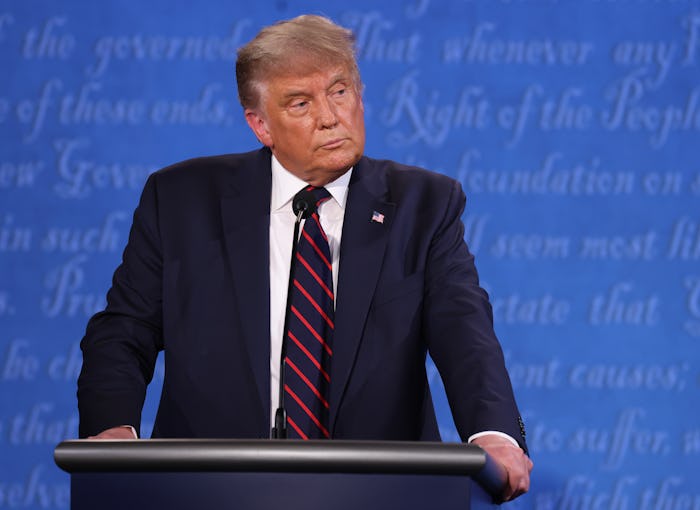News

Trump Is Still Falsely Claiming Children Aren't Vulnerable To COVID-19
During Tuesday's presidential debate, President Donald Trump once again claimed that children are not vulnerable to COVID-19, a respiratory illness caused by the novel coronavirus. But children are impacted by COVID-19, despite Trump's claims. In fact, recent data from 49 states, Washington, D.C., New York City, Puerto Rico, and Guam has shown that more than 620,000 children have contracted COVID-19 since the pandemic began, comprising 10.5% of the country's total COVID-19 cases.
"He wants to shut down the country," Trump said Tuesday in Cleveland of Democratic nominee Joe Biden's proposed coronavirus response plan. "We just went through it. We had to because we didn't know anything about the disease. Now, we've found that elderly people with heart problems and diabetes and different problems are very, very vulnerable. We've learned a lot. Young children aren't. Even younger people aren't. We've learned a lot but he wants to shut it down."
Despite health data proving otherwise, Trump has repeatedly claimed that children and young people are not impacted by COVID-19. In early August, while he pushed for schools to reopen for in-person instruction, Trump falsely claimed children were "almost immune" from COVID-19 during an interview on Fox and Friends.
"This thing is going away, it will go away like things go away. My view is that schools should be open," Trump said. "If you look at children, children are almost, I would almost say definitely, but almost immune from this disease. So few. Hard to believe. I don't know how you feel about it but they have much stronger immune systems than we do somehow for this. They don't have a problem."
Most recently, Trump told supporters at a Sept. 21 campaign rally in Swanton, Ohio, that COVID-19 "affects virtually nobody" below the age of 18.
But health experts, and public health data, have disagreed. While studies continue to show severe illness due to COVID-19 is rare in children, they are far from immune to the disease. According to NPR, data pulled from the health departments of 49 states, Washington, D.C., New York City, Puerto Rico, and Guam shows that as of Sept. 24 there have been 624,890 cases of COVID-19 reported in children.
And while severe illness is generally believed to be rare in children, an Aug. 7 mortality and morbidity report from the Centers for Disease Control and Prevention (CDC) said children of color have a greater risk of hospitalization. According to the CDC, Hispanic children are eight times more likely to be hospitalized with severe illness due to COVID-19 while Black children are five times more likely.
Trump's repeated false claims about COVID-19's impact on young people has even prompted National Institute of Allergy and Infectious Diseases Director Dr. Anthony Fauci to respond. "It isn't just the elderly and those with underlying conditions because it can be serious in young people," Fauci told CNN's Sanjay Gupta in an interview last week when asked about the president's claim.
So while Trump may prefer to believe children aren't vulnerable to COVID-19, public health data has shown otherwise.
If you think you’re showing symptoms of coronavirus, which include fever, shortness of breath, and cough, call your doctor before going to get tested. If you’re anxious about the virus’s spread in your community, visit the CDC for up-to-date information and resources, or seek out mental health support. You can find all of Romper’s parents + coronavirus coverage here.